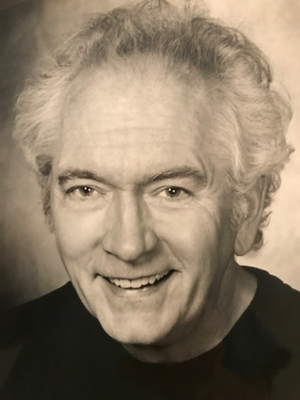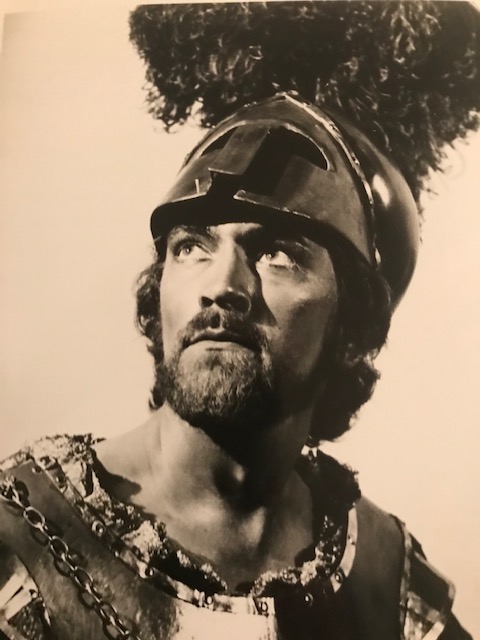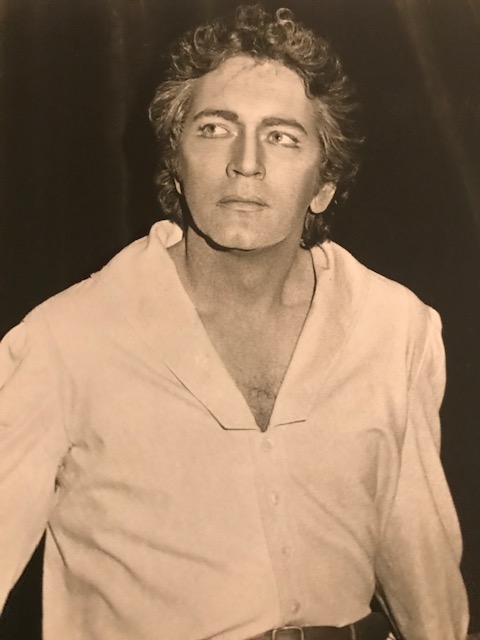Interview: Richard Stilwell of THE ASPERN PAPERS at Dallas Opera
Stilwell Part 2: In Perilous Times, Music is a savior

EM: Besides the Argento and Pasatieri premieres, you also debuted Lidholm's A Dream Play. Do you find performing new operas especially challenging, or enjoy singing something new?
RS: Yes, challenging and exciting. A lot of repertoire you do over and over, while finding new things within those pieces, but something totally new is interesting. Certain contemporary operas are more challenging than others. Pasatieri's Seagull and Lidholm's Dream Play were quite tonal and great fun. I also did Pasatieri's Ines de Castro with Baltimore Opera. I was a good friend of Tom's and it was special having a piece written for you. He'd say, "Would you like a high 'G' here?" And I'd say, "Yeah, that'd be great." [Laughs]
EM: Nothing like knowing the composer.
RS: Argento's works, however, do present challenges. In addition to The Aspern Papers, which is more tonal, I also did his Voyage of Edgar Allen Poe at Chicago Lyric. That was a beast. Tough, quite atonal, but powerful, wonderful once learned. In that realm is the music of Unsuk Chin, a South Korean who's mostly lived in Europe, Germany. She wrote an Alice in Wonderland, which I learned for Geneva Opera late in my career. She had been a student of Ligeti, which may give you a clue as to her style. Very atonal, spiky, difficult. But once learned it was an exciting production. The style worked for this bizarre "mind trip" of this familiar tale. I was the King of Hearts [Laughs]. But I loved working with Argento, a wonderful man. I visited him several times in his home in Minneapolis. Great guy.
EM: You've also done recordings. The Met Bohème, for example.
RS: Magic in the air. The cast all loved working with Franco Zeffirelli. We knew it would be recorded and telecast "Live via Satellite." I adored working with Teresa Stratas, especially our 3rd act scene together. Such a terrific singer-actress. I remember seeing her in Mahagonny. I loved it. You really had to up your game when onstage with her. I think we fed off each other's characters very well. I also loved Carreras, who had done Bohème with me at NYCO in 1972 when he first came to the States. We got to know each other then. Being a part of that longest continually running production in the Met's history, that's pretty special.
EM: I was in the orchestra when Zeffirelli created it. People will always come to see it.
RS: Then singing on the soundtrack of the Oscar-winning Amadeus, another wonderful memory.
EM: Did you do Don Giovanni?
RS: Yes, and the Count in Figaro. [Sings] "Contessa, perdono." The director, Miloš Forman, wanted me to actually be inthe movie. But I would have had to cancel an important Met contract. I asked him through my agent how much time was involved. He said, "We really have no idea." [Laughs] They ended up spending many months there in Prague. That was one regret that I couldn't be in it, but it still was amazing to have been part of that soundtrack. The Falstaff film with Götz Friedrich was probably the hardest project I'd ever undertaken. We recorded the soundtrack first with the Vienna Phil under Solti, then moved to these vast film studios in West Berlin to record the video. The singers had to lip sync to the soundtrack while creating the visual. It was tough coordinating, tedious work shooting from different camera angles several times a shot, 12 to 14 hours every day 7 days a week for 5 weeks. The final product turned out very well, We were all totally exhausted by the finish. But it was memorable. Gabriel Bacquier did Falstaff, another one of my vocal heroes.
EM: And Leppard's Il Ritorno d'Ulisse?

RS: That was special. The cast had just done 10 performances at Glyndebourne, then we took the train to London to record. Dear Flicka was Penelope. I was one lucky baritone regarding this opera, one of my favorites. In '73 I had made my debut at Glyndebourne singing Ulysses opposite Dame Janet Baker. From Baker to von Stade was a dream come true. Working with Peter Hall directing was just phenomenal. Music theatre at its best. I was even able to use my archery skills from when I was younger. There's a scene where Ulysses kills off the suitors. I had archery practice a couple of times a week. The production won all sorts of awards in England. The recording was nominated for a best opera recording Grammy in 1981. Pretty special.
EM: You've done quite a long stint at Chicago Lyric Opera.
RS: I performed in more productions with Lyric than any other house, like 15 seasons. Some all-time favorites like Gluck's Orfeo, a gorgeous production choreographed by the great George Balanchine. He actually choreographed me moving between the dancers-not dancing, mind you, that wouldn't work-but rhythmic walking, very special. I did the Hal Prince Butterfly production. He was wonderful to work with. He didn't do that many operas, but he created a wonderful production. I think it was shown on PBS's Great Performances. A Faust with the superstar cast of Mirella Freni, Nicolai Ghiaurov, and Alfredo Kraus, also televised. The Argento Edgar Allen Poe was a highlight, as was Sir David McVicar's Billy Budd, in which I sang Mr. Redburn. I did Ponnelle's Don Giovanni. I've always loved Chicago, Kerry's hometown. The teaching job at Chicago College of Performing Arts came from a phone call from my dear friend Judy Haddon, who still is teaching there. My singing career was slowly winding down. I decided to accept that part-time job, commuting between D.C. and Chicago. My in-laws lived nearby in Evanston. I stayed with them and assisted with their needs over the years. Payback for the generosity they had shown Kerry and me. Kerry's mother Barbara was one of my favorite people in the world. I adored her enough to write an extended epic poem about her, "Ode to Barbara." I recited it at her funeral. I was able to teach and be a family caregiver for 18 years. My colleagues were like family. David Holloway, Michael Best. Our Dean used to call the 4 of us his "Met Quartet." Through the years were many other teaching colleagues: Cynthia Clarey, Alan Glassman.
EM: Small world, opera. Are there any roles you haven't performed that you wish you had?
RS: Not many, in a career spanning almost 45 years, plus 18 years teaching. I was very fortunate. My other love is Broadway musicals. I did manage to squeeze in productions of South Pacific, Man of la Mancha, Kiss Me, Kate, Kismet.
EM: Is that all?
RS: [Laughs] I would have loved doing Sondheim's A Little Night Music, the role of Fredrik. That would have been a lot of fun. I missed out singing Wolfram in Tannhäuser, the only Wagnerian role I might have, or should have, done. I was contracted for a Peter Sellars production at Brooklyn Academy of Music. The funding was lost for some reason and the project was canceled. I've sung that aria many times. I missed out performing Papageno at historic Teatro Colón in Buenos Aires. At that time, 1973, when I had my contract, Perón regained power in Argentina and nationalized the theatre. I received notice just weeks before my departure for South America that my contract was void and invalid because it was signed under the old regime. Perhaps it was just as well. People were being killed every day on the streets. Not such a good time to be there. There was political stuff going in Milano when I was there. The Communists were marching one day, the Fascists the next. The early 70s were really-we think about today, but looking back, lots going on.
EM: Overall, though, it sounds like you've gotten to do dream work.
RS: I've been really fortunate. No regrets.
EM: We've been lucky to see and hear you.
RS: Thank you, I appreciate it.

EM: On a somewhat sobering note, could you talk about the effect that Covid-19 has had on you personally?
RS: Since I've been retired from the music world for a few years, Covid has not affected me musically. I've been quarantined with my wife, rarely venturing out. However, we have been frustrated in not being able to visit with our new 4 ½-month-old grandson, our one and only grandchild, who lives near San Francisco, to hold or cuddle him. Thankfully we can visit via FaceTime. That keeps us from going insane.
EM: And its effects on the music world in general?
RS: I get very emotional hearing sad stories of many colleagues who have lost jobs, forced to pick up and move or downsize just to pay rent and mortgage. Everyone is frightened and suffering, especially as the virus remains unchecked in much of the country. Very few are working at all. Those few who've gotten European contracts are being locked out because America has failed with protocol procedures. It's very grim, not only for opera but for all the arts. I do think things will turn around, but very slowly. We can only hope the damage will not be irreparable. We've suffered as a country the last 20 years but always rebounding. I used to do "Food for Thought" lectures and talked about the economic meltdown of 2009 and 9-11, about the importance of the arts at such times. What I said then applies to today's pandemic.
EM: Could you share that with us?
RS: It's this: "The world is in a perilous state with war, famine, flood and disease. It seems we're facing calamities of a Biblical nature. Our country is in crisis, which forces me once again to question the intrinsic worth of our simple endeavors to communicate a convincing message. What does it really matter how we relate a song and touch a heart? I honestly believe there is great worth in our efforts, even more so in perilous times...We strive to be artists creating pictures with our voices the way painters highlight and make shadows with their brushes. We strive to be poets with the text of a song, delivering a message which will touch the depths of the soul or create laughter, relieving tension brought on by such woes. We strive to be fine actors, creating space and time of another era. In that sense we become historical educators. Ultimately we render music to an audience of racial, cultural and ethnic differences, knowing the message we impart has none of these boundaries. In that sense we become ambassadors of the arts to all people." So if we have to do it virtually for a while, so be it. We must improvise and perform in any way possible while still remaining safe.
EM: We've all had some bad moments, but personally it's been music that's saved me.
RS: Absolutely. I'm listening to music more now than in many years, rediscovering things that I'd forgotten. There are some upsides to this craziness. Music is a savior.
EM: When this is all over, think how glorious it will feel to see our wonderful artists get up onstage and share their talents in the noble cause of music, having been deprived of it for who knows how long.
RS: I'm tearing up, thinking about it. This world is made better by music and the people who make music. It will come back.
EM: We have to have hope. And on that note, thank you, Richard, for so generously sharing your experiences and philosophies with us.
RS: Thank you so much, Erica.
Photo Credits: James Scholz, Guy Gravett, Szabo
Comments

Videos

